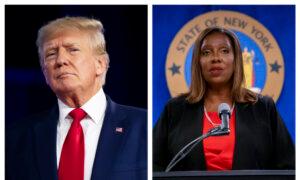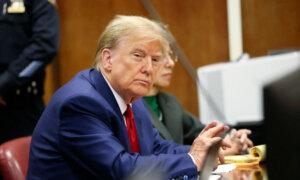The stay is conditioned on the appeals being done by September 2024.
The order came after defense attorneys argued that a $464 million bond was impossible after having contracted four brokers to negotiate with more than 30 companies. Sureties don’t issue bonds that large for private individuals, and even if The Trump Organization were a public conglomerate they could issue such a bond to, it would require some $570 million in cash to cover additional premiums.
The court’s conditions for lowering the bond include President Trump posting $175 million within 10 days and the other orders on the judgment going into effect.
The judgment permanently bars former Trump Organization Chief Financial Officer Allen Weisselberg and former Comptroller Jeffrey McConney from serving in financial control of any New York business entity; permanently bars President Trump, Mr. Weisselberg, and Mr. McConney from serving as an officer or director of any New York corporation for three years; bars President Trump from applying for loans from New York financial institutions for three years; and bars Donald Trump Jr. and Eric Trump from serving as an officer or director in New York for two years.
The stay is conditioned on the appeals being completed by September.
He also released a statement shortly after the appellate ruling, criticizing Justice Arthur Engoron and saying that the new order showed how “ridiculous” his original order was.
“This is a confrontation between a Judge and those that rule above him—A very bad situation in which to place New York State and the Rule of Law!” he stated. “This is the 5th time in this case that he has been overturned, a record. His credibility, and that of Letitia James, has been shattered.”
President Trump maintained that he did nothing wrong and that “New York should never be put in a position like this again.”
He held a news conference at The Trump Building in New York, where he decried the legal action against him as “election interference.”
“‘Court cases’ and ’let’s try to tie him up and take as much as his money as possible,’” President Trump said.
He claimed that Justice Engoron was the “fraudulent valuator,” as his ruling included valuations that have baffled real estate experts, such as $18 million for Mar-a-Lago.
“He ought to be looked at and James ought to be looked at,” President Trump said.
He said “every single one” of his cases was being run by the Biden administration but that it was “backfiring” because the public can see the “lawfare” for what it is.
“We’re going through this weaponization of government to try to knock out someone’s political opponent,” President Trump said. “They could have started this when I left office. … and you know why they didn’t start it? Because they didn’t know I‘d be running, and they didn’t know how well I’d do.
“If I wasn’t running, none of these trials would be happening.
‘Impossible’ Bond
The judgment had been entered on Feb. 23, kicking off a 30-day clock before execution of judgment, which ended on March 25. Days before the deadline, President Trump denounced the judge and attorney general on social media, saying that he had nearly $500 million in cash but that he had intended to use it for his campaign and that it was “election interference” that his political opponents wanted him to use it all in court instead.
In a social media post on the morning of March 25, President Trump said the case was “rigged” and the disgorgement figure set by the judge was what was fraudulent.
“These Radical Left Lunatics and Communists ask me to pay a ridiculous and completely unheard of fine of over $450,000,000 only because they saw a similar amount in my bank account. I had intended to use much of that hard earned money on running for President,” he wrote in another post. “They don’t want me to do that—ELECTION INTERFERENCE!”
The defense has maintained that no wrongdoing occurred and stressed that no victims have been named who are owed the $464 million figure.
Fraud?
At the center of the case are The Trump Organization’s statements of financial condition from 2011 to 2021, though an appeals court had put a statute of limitations on the case, cutting out claims before 2014 and transactions completed before 2016.
The statements aren’t official financial documents, but rather marketing pieces wherein The Trump Organization summarized values of major assets, totaling to a net worth figure for President Trump that the court found to be routinely inflated.
The statements were used to introduce the company in several deals, including securing major loans for development projects. The defense has argued that these deals were done with sophisticated financial entities that read the disclaimer on the statements asking parties to do their own analyses, and did so.
Other parties including the Zurich insurance group also testified that they also did their own analyses, and an appraiser hired by another lender testified that he had been hired to look at 40 Wall Street with no input from The Trump Organization. He disagreed with the organization’s own valuation, giving his employer a different figure.
In a Sept. 26, 2023, summary judgment, Justice Engoron found the defendants liable for fraud, and the trial beginning on Oct. 2, 2023, would deal with materiality and intent to defraud.
During the trial, defendants sought to argue that no fraud had occurred, over the judge’s reminders not to reopen litigation to matters that he had already decided. Toward the latter half of the trial, the defense opted to continue to do so, in order to preserve a record for appeal.
Original News Source Link – Epoch Times
Running For Office? Conservative Campaign Consulting – Election Day Strategies!


